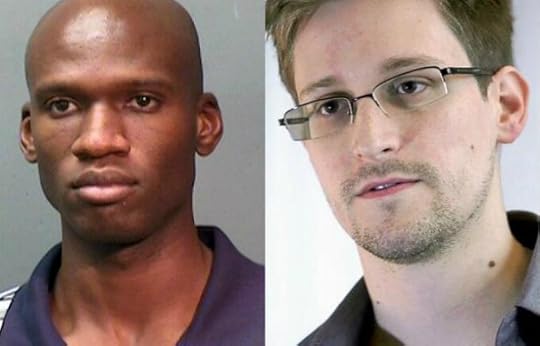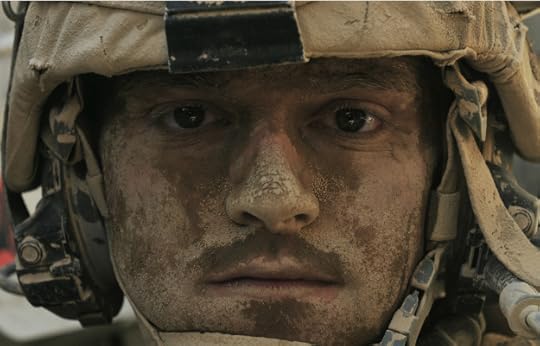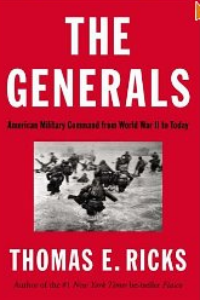Thomas E. Ricks's Blog, page 89
September 20, 2013
Snowden and Alexis: Just what is it with these lousy post-9/11 defense contractors?

Edward Snowden. Aaron Alexis. Two young defense contractors. Both
vetted by USIS. Both did terrible damage to the U.S. government.
I suspect the problem is the government
panic after 9/11. Standards were thrown out the window, along with
accountability. For a decade it was raining money around the Beltway, as long
as you were able to deliver warm bodies with the right credentials. And now, in
various unhappy ways, we are seeing the consequences.
Three questions with William Arkin, author of the new book 'American Coup'

Best Defense: Hi! An "
American Coup
"
? Oy. Bill, have you joined the ranks of the extremist
nut jobs?
William
Arkin: I call my book American Coup because I wanted to distinguish between what we normally think
when we think of a coup (a military takeover deposing civilian government) and
what we live under today, which is security above all else, a shadowy and
impenetrable elite in Washington making profound decisions that affect us
domestically and internationally, an absence of any kind of effective civilian
oversight from Congress, and a contempt for (if not a profound fear of) the
citizenry. When one of the most liberal presidents in our lifetime can come
into office and keep the Republican secretary of defense, the undersecretary
for intelligence, and three retired holdover four stars as the core of his
national security team, you know that there is a continuity of national
security policy more powerful than the elected. And now, almost a term and half
later, all of our grave national security problems in Washington -- cutting
defense spending, Syria's WMD, Snowden -- have a similar genesis in real
decisions not being made, no assumptions being questioned.
I'm not
arguing that any of these things aren't real problems, but WMD? It just fits
the skill set of the elite -- still. And trumps everything else, but brings
with it all the Cold War habits of deterrence, absolutism, and the ultimate
trump card. Is it really worth dropping everything over? What happened to
Obama's speeches about getting rid of our own (and Russia's) WMDs to instill an
international norm?
And
Snowden? With the Navy Yard attack, everyone's saying tighten up the system of
security clearances, look more seriously at contractors. Like Major Hassan
wasn't enough, or our Top Secret America series in the Washington Post, or even Snowden? The American coup is precisely
that the corporate world (and it isn't an industrial complex anymore; it's an
information complex) and the civilian experts and those in uniform are
practically interchangeable. And they need armies of technicians and others to
fight the forever war, the premise and the effect hardly even questioned.
BD: Sure, the Constitution has been under attack by well-meaning
if wrong-minded secret policemen, but do you really think we are that far over
the line?
WA: The
subtitle is "How a Terrified Government is Destroying the Constitution" and I
mean it. To label anything unconstitutional is to just play the game have-your-lawyer-call-my-lawyer
(a game in which Washington always wins), but the relationship of the federal
government to the states and the erosion of state control over law enforcement
(all under the name of homeland security and whole of government/whole of
nation) is real. Even the National Guard ("the militia of the several states"),
which is an institution that predates the Constitution and the United States
itself, has subtly been transformed since 9/11, not because of its exhaustion
in wars in Afghanistan and Iraq, but more because the very reason to have a
Guard -- ensure that a "local" response is first, a response almost always seen
as more effective and more sensitive, and a guard against federal power and
encroachment ("tyranny," in old style words) -- is being undermined by its
enlistment in "regional" and national domestic response schemes. Even as bad as
Katrina was in 2005, I show in American Coup beyond a shadow of a doubt that the local responders were the
most effective, understanding the culture and geography and recognizing that
there was no insurrection going on, while Washington (and the Washington
agencies) practically saw it as an American battlefield. The inside story of
how the Bush administration tried to wrest control from the Louisiana governor
should be instructive. Again, in the unique design of the American
coup, it was the federal military commander on the
ground (Lt. Gen. Russel Honoré) who opposed takeover. The coup was fostered in
the White House and in the shadows of permanent government.
BD: So what should we do?
WA: People
in Washington don't even understand the totality of what goes on in Washington,
naturally leaving the experts -- wonks, SMEs, SESs, contractors -- in charge. They
can outwait any administration, explain away any program as "legal," reviewed,
and in accordance with our policy. The only thing that is going to change that
is if that stranglehold is broken. I think public anxiety over the NSA and
domestic drones, which is greater than public anxiety about WMD or the Middle
East, says a lot about how much Washington pursues a thrust that just isn't
reflecting American interests or concerns. From Tea Party to Occupy, everyone
hates Washington and the ever-growing and isolated DC elite. I would even
venture to guess that the poles of the gun control debate are as much about a
sense that Washington wants to control everything as it is about the Second
Amendment.
It all
boils down to accountability. A Snowden emerges, or a Navy Yard shooting and who is fired? What
is really changed other than the strengthening of the security apparatus, the
very one that failed in the first place? I know it's an exaggeration, but with
Americans already restricted from walking on certain streets in Washington,
with overlapping police departments and intelligence jurisdictions and homeland
security 10 years later still desperately searching for a mission, we're not
that far away from checkpoints, or national ID, or some kind of universal
biometrically-driven control system. If we just demanded that people in
government did their basic jobs, we'd be a lot closer to a better system.
Guest war dog of the week: This soldier and his wife sure loved their dogs

That's Richard
FitzAlan, the tenth Earl of Arundel. He fought in France and Scotland and
commanded the English army for awhile. He also was incredibly rich. He died in
1375 or 1376 -- accounts differ. In their tomb, he and his wife are depicted
with their dogs sleeping at their feet
Philip Larkin wrote
a lovely poem about this tomb that ends with these lines:
Our almost-instinct almost true:
What will survive of us is love.
September 19, 2013
The U.S. military, mythology, and Abu Ghraib: An intelligence officer's view

By Lt. Col. Douglas A. Pryer
, U.S.
Army
Best Defense guest columnist
We U.S. servicemembers tend to construct and preach
false mythologies about ourselves, perhaps even more so than the members of
other large organizations. This stands to reason. Our core business is, in
service to our nation, managing violence and this violence's effects. Being
human beings and not machines, we want to believe that when we kill, maim, or
injure other human beings, it is to good purpose. Deep down, we know sometimes
it isn't. But this doesn't stop us from always wishing that our violent actions,
and those of our comrades, serve a higher good.
So, in war, we try to convince ourselves that the
leaders and foot soldiers we are fighting are the worst people on the planet,
while our own leaders and comrades are the very best. And when U.S. troops commit
crimes, we work hard to believe that these crimes were the work of a few "bad
apples," of criminals who can never be completely screened from an organization
the size of ours. By thus disassociating ourselves, our military, and our
nation from these criminals, we hope to make ourselves feel less "tainted" by
their actions.
However, this very human, very understandable tendency contains a
profound danger: If we fail to see ourselves truly, if we wish away some of the
causes of some of our comrades' worst actions, we can cripple our ability to
reduce the chance of such misdeeds happening again.
One prominent example of potentially dangerous
myth-building can be found in this summer's issue of Parameters. George R. Mastroianni's "Looking Back: Understanding Abu Ghraib" sets out to
revise current narratives about the Abu Ghraib scandal.
Mastroianni, a psychology professor at the U.S. Air
Force Academy, says there are two competing narratives about Abu Ghraib, the
"bad apples" and "bad barrel" narratives. The "bad apples" narrative places the
blame for the scandal's crimes on Staff Sergeant Ivan Frederick, Specialist
Charles Graner, and the others convicted of crimes. He claims that the "bad
barrel" interpretation, which places the blame for these crimes on higher-ups
and turns the criminals into victims, is the dominant narrative. This is thanks
to "sensational" stories provided by journalists such as Seymour Hersh, lawyers such as Gary Myers, and academics such as Phillip
Zimbardo. He then offers a version that falls between these two narratives.
This sounds reasonable, unless one believes that
the dominant narrative already places blame on both "bad apples" and a "bad
barrel." When seen in this light, Mastroianni's real motive becomes clear: He
desires to do away with the idea that the Bush administration and certain
senior military leaders were even indirectly responsible for the Abu Ghraib
scandal.
According to Mastroianni, the crimes at Abu Ghraib
had nothing to do with so-called "enhanced" interrogation techniques (EITs). He
says that the facts of the cases that were prosecuted "do not comport with the
interpretation of Abu Ghraib as an example of the pernicious consequences of
American 'torture' policy, or as evidence of the migration of enhanced
interrogation techniques from Guantanamo to Iraq." He argues that, yes,
superiors were to some degree to blame for abuses at Abu Ghraib, but only
inasmuch as they produced "chaotic and confusing policy changes" and failed to
adequately supervise soldiers.
This thesis is more than misleading. It is wrong.
It ignores the fact that EITs undeniably migrated from Guantanamo Bay (Gitmo)
and Afghanistan to Abu Ghraib. It ignores documented cases of abuse at Abu
Ghraib that, while unprosecuted, definitely involved EITs and intelligence
collection processes. And it assumes away any link between the widespread use
of degrading, dehumanizing tactics at Abu Ghraib and the photographed crimes
that occurred at the same time.
Here is a fraction of what we know about the
migration of EITs to Abu Ghraib and "the pernicious consequences" of this
migration:
On December 2, 2002, former Secretary of Defense Donald Rumsfeld
approved for use at Gitmo such EITs as "Removal of clothing," "The use of
stress positions (like standing) for up to four hours," and "Using detainee
individual phobias (such as fear of dogs)." He rescinded this policy on January
15, 2003, when some service lawyers protested.
In August 2002, Company A, 519th Military Intelligence Battalion,
began running interrogation operations at Bagram, Afghanistan. Their
officer-in-charge of interrogations, Captain (CPT) Carolyn Wood, received a
faxed list of EITs from Gitmo in December 2002. In January 2003, her
interrogators were authorized by Combined Joint Task Force (CJTF) 180 command
policy to implement such EITs as "Removal of Clothing," "Stress Positions," and
"Exploiting Fear of Dogs."
A few months
later, CPT Wood deployed with her company to Abu Ghraib. On her own authority,
CPT Wood told her interrogators that they could employ "Sleep Deprivation" and
"Stress Positions." She later testified: "Because we had used the techniques in
Afghanistan, and I perceived the Iraq experience to be evolving into the same
operational environment as Afghanistan, I used my best judgment and concluded
they would be effective tools for interrogation operations at AG." A number of
soldiers testified that her interrogators also continued to direct guards to
remove prisoners' clothing.
CPT Wood submitted
a draft interrogation policy to CJTF-7, the highest military command in Iraq.
According to Wood, she had plagiarized this draft policy from that used by the
elite Special Mission Unit (SMU) task force in Iraq. This SMU's policy, in
turn, was derived from the interrogation policy of the SMU in Afghanistan.
Wood's draft policy and Gitmo's April 2003 interrogation policy heavily
influenced CJTF-7's September 14, 2003, interrogation policy, which included
nine EITs that could be used with the approval of the CJTF-7 commanding general,
Lieutenant General (LTG) Ricardo Sanchez.
The revised CJTF-7
interrogation policy of October 12, 2003, continued to require interrogators to
request EITs from LTG Sanchez. Sanchez approved the EIT of "Isolation" on at
least 25 occasions. Additionally, Colonel (COL) Thomas Pappas, the 205th MI
Brigade commander, testified that he believed (wrongly, according to Sanchez)
that Sanchez had delegated to him the authority to approve "The Use of Military
Working Dogs" as part of interrogation plans, which Pappas then did.
This October
policy stated that interrogators needed to control "all aspects of the
interrogation, to include the lighting, heating and configuration of the
interrogation room, as well as the food, clothing and shelter given to the
security internee." This led some interrogators to believe they could employ
such EITs as "Removal of Clothing" on their own authority.
CIA operatives
employed EITs during interrogations at Abu Ghraib. On November 4, 2003, a
detainee died during an abusive CIA interrogation. The Fay Report, the summary
of the Army investigation into intelligence activities at Abu Ghraib, said:
"CIA detention and interrogation practices led to a loss of accountability,
abuse, reduced interagency cooperation, and an unhealthy mystique that further
poisoned the atmosphere." Shortly after taking office, President Barack Obama
declassified three legal memoranda (the "Torture Memos") listing EITs and
justifying their use by CIA personnel.
According to
multiple soldier testimonies, COL Pappas and Lieutenant Colonel Steve Jordan,
the officer-in-charge of all intelligence operations at Abu Ghraib, saw naked
detainees at the prison's hard site and didn't stop the practice. The Fay
Report confirms that the use of nudity to support interrogations was a
technique imported to Iraq from Afghanistan and Gitmo. It adds: "The use of
clothing as an incentive (nudity) is significant in that it likely contributed
to an escalating 'de-humanization' of the detainees and set the stage for
additional and more severe abuses to occur."
Most of the convicted crimes and other abuses occurred in the hard
site's Tier 1A, where interrogation subjects were held. Of the 44 abusive
incidents that were reported at the hard site, the Fay Report catalogs more
than half of these as involving interrogators or military intelligence
processes.
It is possible that Abu Ghraib's prosecuted crimes
would have happened without "Removal of Clothing," "Stress Positions,"
"Exploiting Fear of Dogs," and the other degrading EITs brought there from
other theaters. However, that interpretation stretches the limits of credulity.
A far more credible explanation is that the systematic, degrading treatment of
prisoners was one of the factors that created a slippery moral slope and
enabled worse crime. This is also the apparent pattern of abuse at several
other detention facilities employing EITs in Iraq and Afghanistan at the time,
including facilities at Bagram, al Qaim (Forward Operating Base Tiger and
Blacksmith Hotel), al Assad (FOB Rifles), Mosul (Strike Brigade Holding Area),
and Baghdad (Camp Nama).
Once the genie of "degrading treatment of others"
is unleashed from its bottle, it is extremely difficult to put this genie back
in the bottle -- or to restrain increasingly atrocious conduct.
There are more minor problems of fact in
Mastroianni's essay. For instance, he reports that the suffocation of Major
General Abed Mowhoush in a sleeping bag at al Qaim, Iraq, was the result of a
"free-lanced" tactic. This tactic was actually a variation of the "close
confinement quarters" EIT that placed subjects in small boxes or coffins to
induce claustrophobia. Lewis Welshofer, the warrant officer who killed
Mowhoush, had even specifically recommended this technique to CJTF-7 for
inclusion in policy.
How could Mastroianni imagine that EITs didn't play
a significant part in Abu Ghraib abuse? His choice of sources is telling. He
cites material from a military investigative report only once, never mentions
specific interrogation memoranda, and doesn't reference any of the hundreds of
witness statements available to researchers. Instead, to support his argument,
he relies largely on one second-hand account, Christopher Graveline's and
Michael Clemens's The
Secrets of Abu Ghraib Revealed.
Graveline helped prosecute all but two of the
soldiers convicted of crimes at Abu Ghraib, and Clemens served as an
investigator for the prosecution. Secrets
of Abu Ghraib is well worth reading, though its title is a bit of a
misnomer. The book actually provides few facts that weren't previously
disclosed via other sources (though it does provide some new facts). What it
does most successfully is relate many of these facts as they pertain to the
prosecuted cases in a highly readable narrative. It also performs a service in
reinforcing the fact that the photographed crimes largely did not involve
interrogation subjects and that these particular crimes were not specifically
ordered by higher officials. Graveline and Clemens conclude that, on the
continuum between the "bad apples" and the "bad barrel" narratives, "criminal
culpability [for the crimes that occurred at Abu Ghraib] falls closer on the
continuum to the enlisted soldiers working the night shift who were identified
and prosecuted."
That is a reasonable conclusion. But, "criminal
culpability" is not the same thing as "moral responsibility." Just because the
moral responsibility of senior leaders for the crimes at Abu Ghraib didn't
cross the threshold of what existing law deems prosecutable, that doesn't mean
this responsibility is absent. In the case of the abuses at Abu Ghraib, it
clearly is present.
It is truly easy to sympathize with Mastroianni's
wish to absolve senior leaders from any responsibility for the Abu Ghraib
scandal. This scandal was an exceedingly ugly, twisted episode in our nation's
history that no one but our enemies are glad occurred. It is thus doubtful that
he deliberately distorted and cherry-picked facts from mostly secondary sources
to support his desired narrative. Rather, being human, he looked only as deeply
as he wanted to look and so saw only what he wanted to see.
In the final analysis, Mastroianni writes very
well, and his attempt to reevaluate existing narratives is laudable. No narrative
should be deemed sacred. But he would have performed a greater service if he
had held up a more polished mirror that clearly reflected, warts and all, the
roles that senior leaders played in creating one of our nation's greatest moral
defeats. Only via acts of sometimes painful self-awareness can we see ourselves
clearly and, hopefully, prevent future Abu Ghraibs.
Lieutenant Colonel Douglas A. Pryer
is a counterintelligence officer who helped manage interrogation
operations for Task Force 1st Armored Division in Baghdad when the
Abu Ghraib abuses were occurring. He is the author of the Command and General
Staff College Foundation Press's inaugural book,
The Fight for the High Ground: The U.S.
Army and Interrogation During Operation Iraqi Freedom, May 2003 - April 2004.
The views expressed in this article are those of
the author and do not reflect the official policy or position of the Department
of the Army, Department of Defense, or the U.S. government.
How deep runs the digital divide?

And is the distance between the
post-Internet generation (who are operating the country) and their pre-Internet
elders (who think they are running it) the generation gap of our time?
I suspect it is far deeper than we
think. This is not just a matter of different attitudes toward Edward Snowden.
I am guessing that growing up digital changes a lot of views and attitudes, and
even perhaps how the human mind works.
Churchill on the Pathan worldview

I generally am underwhelmed by Winston
Churchill's writings about India, but I do think he captures a thought well
when, in My
Early Life, he
summarizes the Pathan/Pashtun worldview: "Every man is a warrior, a politician
and a theologian."
September 18, 2013
Moral courage: Three Army lt. cols. call out their service for dangerous hypocrisies

They're
speaking truth to power in the new issue of Military
Review: The best of a good issue is an article titled "The Myths We Soldiers
Tell Ourselves."
Written by three lieutenant colonels (one retired, two on active duty, all
steeped in ethical studies), it detects a significant discrepancy between the
Army's stated values and its actual behavior:
The biggest problem with the Army Values is how they are
sloganeered. By simply saying them, we soldiers frequently delude ourselves
into thinking they make us more ethical, like they are a talisman. Indeed, they
can actually set the stage for unethical action by inspiring moral complacency
and allowing us to justify nearly any action that appears legal.
The authors are
especially concerned by the failure of the Army to hold accountable soldiers
involved in the torture and murder of prisoners. For example, they note, "Of the 100 detainees who died in U.S. custody between 2002
and 2006, 45 are confirmed or suspected murder victims. Of these, eight are
known to have been tortured to death. Only half of these eight cases resulted
in punishment for U.S. service members, with five months in jail being the
harshest punishment meted out. This is only a summary of the most extreme
cases."
My reply to Col. Fivecoat in Parameters

Parameters very
nicely ran my
response to Lt. Col. Dave Fivecoat's article about some aspects of my
book The Generals. Here
it is:
Thank you for running Lieutenant Colonel David G.
Fivecoat's essay on "American Landpower and Modern US Generalship"
(Winter-Spring 2013). I don't agree with everything he writes, but nonetheless
am pleased to see Fivecoat's article because it is exactly the type of work I
hoped my book The Generals: American Military Command from World War II to
Today would provoke. I had thought that General Brown's articles in ARMY
magazine might launch such a discussion, but that magazine shied away from
engaging, without explaining why, as if discussing the quality of leadership
in today's Army somehow was impolite.
Most of all, I am fascinated by Fivecoat's finding (page
74) that leading a division in combat in Iraq seems to have hurt an officer's
chances of promotion. That worries me. What does it mean? That discovery of
his indicates that the Army of the Iraq-Afghanistan era is out of step from the
historical tradition that for an officer, time in combat is the royal road to
advancement. I cannot think of other wars in which service in combat hurt an
officer's chance of promotion. It is, as Fivecoat almost (but not quite) says,
worrisome evidence that the Army for close to a decade persisted in using a
peacetime promotion system in wartime.
In addition to breaking new ground intellectually,
Fivecoat's article is also courageous. It is one thing for me, a civilian
author, to question the quality of American generalship in Iraq and
Afghanistan. It is quite another thing for an active duty lieutenant colonel to
do so, especially since the Army's official histories have tiptoed around the
issue of the failings of senior leadership in our recent wars.
Two final observations:
I think Lieutenant Colonel Fivecoat lets today's Army off
too easily on its lack of transparency. To me this reflects a bit of drift in
the service, a loss of the sense of being answerable to the nation and the
people. Being close-mouthed about its leadership problems gives the impression
that the Army's leaders care more about the feelings of generals than the
support of the American people.
Finally, I have to question Fivecoat's assertion
that minimizing disruption optimizes performance. It wasn't the case in World
War II. Why would it be the case in Afghanistan or Iraq? It may be-but it
remains an unproven assumption, and to my mind, a questionable one. The
opportunity cost of averting disruption can be large, because such passivity
(or "subtlety," as he terms it) results in the apparent rewarding of
risk-averse or mediocre commanders. What would Matthew Ridgway say about such a
policy of minimizing disruption?
Thank you again for running such an illuminating and
thought-provoking article.
Soon: Fivecoat fires back!
The FBI file on the nature of leadership, the Navy file on busting former skippers

Nothing really surprising in the
FBI list, but
worth reviewing.
Speaking of leadership, the former skipper of the USS Mustin was busted for allegedly accepting bribes (and the services
of prostitutes) from a Navy support services contractor.
September 17, 2013
A Marine captain lists 10 things he wishes he knew before commanding a company

Capt.
Lucas Balke writes in the September issue of the Marine Corps Gazette that there are 10
things he wishes someone had told him when he was a lieutenant. (I really like "what
I've learned" articles, and I also am happy to highlight this article because
I've been hard on the poor old Gazette in recent years.) Here they are:
Plan
now to command a company.
Start
collecting PME items.
Read
10 pages a day.
Become
an expert regarding one battle.
Start
constructing your "perfect" field exercise.
Enable
your Marines to be self-sufficient.
Prepare
your Marines to be dismounted
infantrymen.
Trust
your NCOs.
Be
prepared to fight tomorrow's counterinsurgency.
Learn
to train for free.
Tom
again: What do you wish you'd known before taking your current position?
Thomas E. Ricks's Blog
- Thomas E. Ricks's profile
- 436 followers



